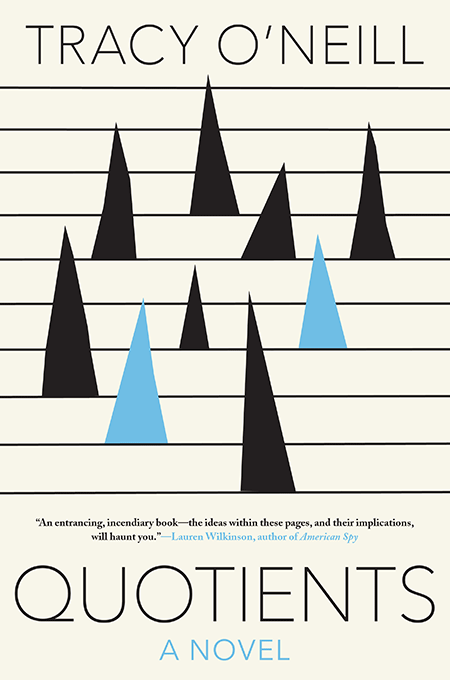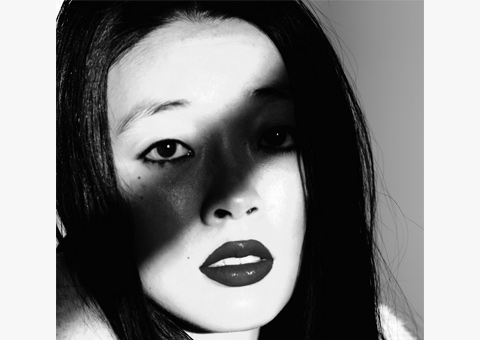
In Tracy O’Neill’s upcoming novel, Quotients, two people search for connection in a world of fractured identities and aliases, global finance, big data, intelligence bureaucracies, algorithmic logic, and terror.
MD: Quotients is many things, among them: a big, ambitious systems novel of the sort that is often stereotyped as the province of white men (e.g., David Foster Wallace, Don DeLillo, Thomas Pynchon). I wonder how much you thought about that during the writing, and if you can also talk about the process of bringing so many threads together in a single book.
TO: I started writing this book after meeting a man who told me he’d once been a spy. At first, I was intrigued by how that career might make someone fixate both on watching and being watched—and how that would structure intimate relationships. The more I thought about it, though, the more I thought that watching and being watched is the state most of us find ourselves in today: in our online lives, in our knowledge of massive government surveillance programs, etc. So I started tying knots around the characters, plotting out modes of watching and watchedness, connectedness if not connection. I knew this was a story that was going to need spies and geeks and advertising types and academics, sincere hacks and liars and generations of families, to even approximate an entire globalized society.
It’s true few systems novels by women of color have been published, but I think that my experience as a woman of color is precisely what animated the novel. Being an Asian-American woman in a predominantly white society has made me attuned to the simultaneous illegibility and hypervisibility of my body, the watchedness that I mentioned is so important to the book. I have seen categories and expectations fail to contain me, just as the algorithms and dossiers fail to contain the characters in my novel. So my experiences very much informed the emotional exigencies and techno-political critiques of Quotients.
MD: I’m fascinated by writers—such as yourself—who pursue very different projects from book to book. Can you talk about some of the differences between writing your debut novel and now this, your second?
TO: My first novel, The Hopeful, was quite zoomed into the experience of a single character, turning on the failed project of individualism and the failed body. When I began Quotients, I wanted specifically to attempt a book with a grander cast of characters and more orchestral plotting. I wanted to get at the textures of feeling that are collected in a mass consciousness, or a zeitgeist. The book, like the internet, is willing to rabbit-hole through the links, connecting several plots and characters, while in the first novel I wanted to build an almost claustrophobic pressure. But both novels are interested in the way obsessive quests for perfection engineer loneliness and alienation.
MD: It’s interesting to hear you compare the structure of the novel to the structure of the internet—I had similar thoughts while editing it. Can you talk a little more about what we might call the “decentralized” nature of the novel? Were there other models that inspired you during the writing?
Joan Didion’s political novels were an important influence in the chapter structure, and I also am fascinated by writing that experiments with fragment structures, from Maggie Nelson to Wittgenstein, Anelise Chen to Walter Benjamin.
The book is written in short chapters, what I think of as “data bytes” of the novel. I needed the form to convey the way in which our lives are dispersed in parcels of experience through telecommunications technologies. At the same time, I wanted the narrative structure to put the reader in a position of trying to draw together the data points to figure out who these characters are, what their stories are. In this way, the reader is following the process of the novel’s characters who are trying to see the connections between various bits of information to make sense of their world.
MD: Given the rapid evolution in technology and social media, did you find it hard to put yourself into the world of the beginning of the novel, which opens with the July 7 2005 terror attacks in London—that is, to “unremember” all the changes to internet and communication technology since then, and then chart some of how those systems evolved in the years that followed?
TO: Absolutely. One of the first things I did—that I would repeat throughout the writing process—was draw up tech innovation timelines. I was thinking about how technologies structure our experiences. When the novel begins, the iPhone has not been released yet. On the day of the bombings, the characters do not first turn to their phones for information. They turn to television. That isn’t what they would do in 2014 when the novel ends.
MD: There’s a central relationship in the book, between the characters Alexandra and Jeremy that is greatly impacted by various technologies. To what extent do you think that the internet and technologies of communication and surveillance have transformed relationships? Are there things that are better now than before the internet, or are you more pessimistic about how these technologies effect, to put it in a word, love.
TO: How much time do we have? I’m not a technological determinist, so I don’t think that technology completely dictates the shape of our society or culture, especially given that global internet usage is around 50%. Telecom and big data has massively influenced our relationships though.
It’s wonderful that we can communicate at great distance quickly and can find subcultures that we might not if constrained to meeting in person in the geographic zones we frequent. But the polarizing effect of algorithms, for example, does threaten our ability to form relationships. I think about dating app data leaks. I wonder whether too often we confuse liking what the feed shows us with true care. And a culture of digital surveillance, the threat of doxing and outing and revenge porn—these can have chilling effects on our speech and behavior, can change the calculus of when attempts to connect are too risky.
I’m in the camp that wants to see more privacy protections. I don’t think privacy and isolation are synonymous. I think more robust privacy protections can in many cases give us the freedom to risk, amongst other things, love.
Quotients will be available on May 12. Order here.

Tracy O’Neill is the author of The Hopeful, one of Electric Literature’s Best Novels of 2015, and Quotients. In 2015, she was named a National Book Foundation 5 Under 35 honoree, long-listed for the Flaherty-Dunnan Prize, and was a Narrative Under 30 finalist. In 2012, she was awarded the Center for Fiction’s Emerging Writers Fellowship. Her writing has appeared in Granta, Rolling Stone, The Atlantic, the New Yorker, LitHub, BOMB, Vol. 1 Brooklyn, The Literarian, New World Writing, Narrative, Scoundrel Time, Guernica, Bookforum, Electric Literature, Grantland, Vice, The Guardian, VQR, and the San Francisco Chronicle. Her column Body Language appeared in Catapult. She attended the MFA program at the City College of New York and the PhD program in communications at Columbia University.